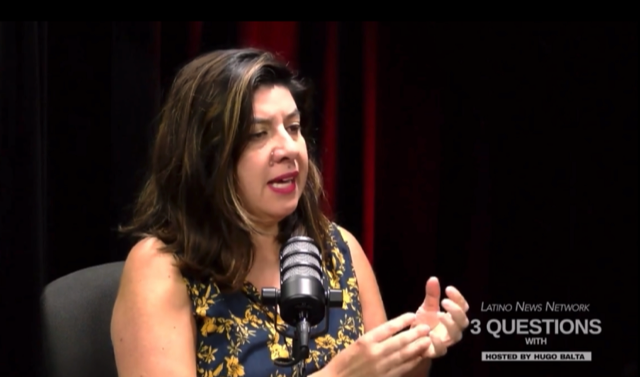Across the U.S. and Illinois, COVID-related hospitalizations are up.
Earlier this year, the Biden administration ended the public health emergency for COVID-19. But, for some, the crisis is over – for many, the risk is as real today as it was at the pandemic’s beginning.
Illinois Unidos, a coalition of more than 150 healthcare workers, policy advocates, representatives from community-based organizations, and elected and appointed officials, are working to ensure Latinos aren’t left behind in public health and beyond then and now.
Alejandra Ibanez, Executive Director, Illinois Unidos was a guest on the program “3 Questions With…” hosted by Hugo Balta, publisher of IL Latino News.
Ibanez shared how, early in the pandemic, resource allocation decisions about COVID-19 cases weren’t equitable. Latinos, the community most negatively impacted by the health emergency, weren’t receiving the necessary resources proportional to the devastation. Language barriers added to the poor communication between officials and the public.
“Because there really wasn’t good coordination or linguistically appropriate or culturally competent information about COVID-19 -people really thought that they were going to get a chip in their arm when they got the vaccinations,” said Ibanez.
Data from the Household Pulse Survey show that more than 40 percent of adults in the United States reported having COVID-19 in the past, and nearly one in five of those (19 percent) are currently still having symptoms of “long COVID.” Ibanez shared the experience of an IU board member, “A very healthy 50-year-old woman, now has over 13 long COVID symptoms when she was absolutely healthy beforehand. She’s doing her best to work, but she has brain fog, her lungs are damaged, (and) now they’re starting to find that she has issues with her kidneys.”
A native of Chile, Ibanez moved to the U.S. as a child. She experienced firsthand the injustices undocumented people face in having access to healthcare. “My mother was found to have cervical cancer when I was about 13. She didn’t have access to health insurance, but my mom was able to get the care she needed through what I think was a federally qualified clinic,” Ibanez said about the community organizations that assisted her mother.
The experiences of being an undocumented newcomer with a family facing economic and health obstacles led to directing an organization that addresses the needs of the Latino community. “The recovery of COVID is not over,” Ibanez said about Gov. J.B. Pritzker’s administration’s decision earlier this year to scale back Medicaid-like health care benefits to undocumented immigrants. “For Latinos and other essential workers that find themselves in low wage work their recovery is going to be completely hampered.”
“3 Questions With…” is co-produced by the Latino News Network (LNN), an independent multimedia digital news outlet with local newsrooms nationwide, including IL Latino News and CAN TV, Chicago’s hub for community-centric news, hyperlocal stories, and educational resources.
